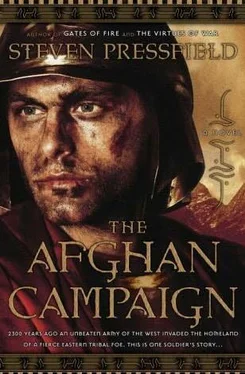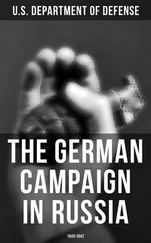Steven Pressfield - The Afgan Campaign
Здесь есть возможность читать онлайн «Steven Pressfield - The Afgan Campaign» весь текст электронной книги совершенно бесплатно (целиком полную версию без сокращений). В некоторых случаях можно слушать аудио, скачать через торрент в формате fb2 и присутствует краткое содержание. Жанр: Исторические приключения, на английском языке. Описание произведения, (предисловие) а так же отзывы посетителей доступны на портале библиотеки ЛибКат.
- Название:The Afgan Campaign
- Автор:
- Жанр:
- Год:неизвестен
- ISBN:нет данных
- Рейтинг книги:4 / 5. Голосов: 1
-
Избранное:Добавить в избранное
- Отзывы:
-
Ваша оценка:
- 80
- 1
- 2
- 3
- 4
- 5
The Afgan Campaign: краткое содержание, описание и аннотация
Предлагаем к чтению аннотацию, описание, краткое содержание или предисловие (зависит от того, что написал сам автор книги «The Afgan Campaign»). Если вы не нашли необходимую информацию о книге — напишите в комментариях, мы постараемся отыскать её.
The Afgan Campaign — читать онлайн бесплатно полную книгу (весь текст) целиком
Ниже представлен текст книги, разбитый по страницам. Система сохранения места последней прочитанной страницы, позволяет с удобством читать онлайн бесплатно книгу «The Afgan Campaign», без необходимости каждый раз заново искать на чём Вы остановились. Поставьте закладку, и сможете в любой момент перейти на страницу, на которой закончили чтение.
Интервал:
Закладка:
There Shinar takes me. I fall into the straw in a stupor. When I awake, as I do for days in fits of terror and dislocation, I see her tending to Snow. She rubs the mare down, dries and wraps her feet, gets good grain and sweet water into her belly. “What about me?” I groan.
“I’ll get to you in good time,” she says.
I sleep for a month, it seems, enveloped by her scent. The warmth of her flesh restores me.
It seems she has become a different person, warmer and kinder and less crippled within. Have I altered too? Or just never known her?
Ghilla is sweet about vacating our chamber. She senses the moment and takes up little Lucas. “Time for a walk, Tiny Bundle.”
Like all army women, Shinar knows the corps’ plans before we soldiers do. The spring offensive will be full-scale. Four Afghan warlords remain-Oxyartes, Chorienes, Catanes, and Austanes-commanding a total of about forty thousand men. They have repaired to various fastnesses in the Scythian Caucasus. In spring we will besiege them. Advance elements have already taken station, investing the foe and cutting off all escape.
I cannot think of Lucas. When his memory enters my thoughts, I banish it. It’s too soon. I will break down otherwise.
His child is a blessing. What would we do without him? Ghilla and I tread gently around each other. Nothing she can ask is too much. And she acts the same toward me. We never speak Lucas’s name. Next year maybe. I will not be first to do it.
Winter stays dark this far north. How these tribes survive, or even wish to, is past my comprehension. Even Alexander must respect this remoteness. He has come to call Jaxartes City “Alexandria Eschate”-Alexandria-the-Furthermost. He renounces all claim to the Wild Lands. Let the Massagetae keep them. Our lord will mark here the northern extremity of his empire and call the free Scyths beyond it his allies and friends.
It’s as good a plan as any.
On a day when the west wind brings the first scent of spring, my brother Philip arrives from Maracanda. He has been south in the mountains, treating with tribal chiefs of Chorienes and Oxyartes. We spend a long, happy night-Shinar and Ghilla and I, with Flag and his woman and Stephanos (who still will have none but his wife back home).
“What’s holding up the peace?” the poet asks my brother.
“Same thing that always holds it up. Pride.”
A way must be found, Philip says, that will let both sides claim victory. For the warlords this is a matter of life and death; they will not survive their own tribesmen’s fury if they are seen as having presided over defeat. Intertribal suspicion further impedes the process. Each chieftain fears that he will lose power in postwar Afghanistan; he will not set his name to any accommodation until he knows where he-and his rivals-stand in its scheme. No one wants to keep fighting. War has devastated the country. Philip reckons we’ve wiped out half the men of military age, in a society where that means every male from twelve to eighty.
“Where is your woman?” Shinar asks him.
He laughs. “Can’t afford one.”
Shinar schemes of putting Philip together with Ghilla. Even one night would do them both good. But when the moment presents itself at evening’s close, Philip with grace declines.
“Stay at least and talk,” says Shinar. “The night is cold and we may not see you again for many months.”
We stay up-my brother, Shinar, and I-into the deep hours.
“Don’t say you heard this from me,” Philip says, “but more bonuses are coming.” Alexander will rain gold this spring upon the troops who have suffered with him through this campaign. It only wants peace for the treasury doors to open. “Will you marry?” he asks Shinar and me.
“If she’ll say yes.”
It makes Philip happy to see us together.
“Whatever you do, don’t stay out here. The army will tempt you with cash incentives and grants of land larger than counties back home. Don’t fall for it. This place will revert to tribal ways as soon as Alexander moves on. Take your pay home, Matthias. You’re rich. You can buy any place you fancy, or farm Mother’s with Agathon and Eleni. They’d like nothing better. It will not be as bad as you think, Shinar. We Macks are not all devils. You’ll be a citizen, and so will your child.”
Shinar absorbs this impassively, like some dream she believes can never come true. Philip regards her with tenderness.
“May the gods bless you, dear child, and your infant on the way. I know you have suffered more than Matthias and I can imagine. It’s good to see you happy. And I can never thank you enough for the change you have wrought in my brother.”
His voice cracks. Shinar crosses to the carpet beside him. She takes his hand. “What about you, Philip? Will you go home now?”
“The corps is my home, Shinar.”
Lamplight shows the gray in Philip’s hair. Fever, I know, has carried off his wife back home; his son in a few years will be out east with the army. Heaven alone knows how many mates he has lost in action. He smiles at Shinar’s hope for his remarriage.
“What wife could I take, dear child? What woman could I bring happiness to? I have gone to army whores too long. I like them. I don’t have to explain myself to them. Do you understand? Can I really dandle some infant on my knee?” He laughs darkly. “I have been at war now, man and boy, for two-thirds of my life. What other trade do I know? My home resides in hell, if anywhere, where those I love wait for me.” He smiles. “I think I shall not keep them long.”
“Don’t talk like that,” Shinar scolds him. “I’ve done it myself. It serves no purpose.”
She’s right of course, Philip acknowledges.
“Can I return to Macedon?” he asks. “Before Elias died, perhaps. Now never. The only thing that keeps me above the earth is you two and your child on the way. So I say to you both, as I have before: Don’t be like me. Get out of here. Seize your happiness while you still can.”
Dawn lacks an hour when Philip takes his leave. We walk outside under stars bright as embers. Philip’s bad leg locks up in the cold.
“What about Shinar’s brother?” he asks.
He knows of the brother’s obligation under nangwali to efface the shame she brings to her family by being with me-and of her two cousins’, who stand with him, wanting only the chance.
“They’re all bluff,” I say. “In any event, the lot of ’em are three hundred miles south with the mountain brigades.”
“We’ll all be down south in the spring.”
Philip wants the brother’s and cousins’ complete names-given, patronymic, clan, and tribe.
“Look,” I say, “I don’t want you doing anything to them.”
Philip regards me soberly.
“Why not?”
48
Spring comes. Coenus’s brigade deploys south to the mountains. Alexander and the heavy divisions are already there.
For efficiency and mastery of combat arms, the world has seen nothing like this force. The king has been modernizing all winter, upgrading and expanding the corps’ capacities for mountain warfare. Siege gear that formerly needed transport by freight wagons and oxen has been simplified and stripped down so that it can be packed on the backs of mules. We have mountain catapults now that can sling a stone or a pot of flaming naphtha a fifth of a mile. Trains pack thin sheets of bronze to face mantlets of timber, rendering them flame- and fireproof. Tortoise-type carapaces have been fashioned, beneath which men can mount scaling ladders and not fear scalding oil or superheated sand. Carpentry shops have labored all winter producing block and tackle; rope-makers have laid in miles of cable. Ingenious mechanisms have been fashioned, like the mountain windlass that uses torsion bands instead of heavy iron ratchet teeth. Two of these, braced to boulders, can raise a siege tower forty feet high. In the past, mountain warfare has been limited to clashes between skirmishers, who sling missiles and scamper away, while siege warfare has been confined to the plains. No more. To take down these summit citadels, Alexander’s engineers have advanced siege technology to a whole new sphere and scale. The supply corps has half a thousand mules packing nothing but oil of terebinth-turpentine-for making incendiary bombs and as solvent to clean the blades of the axes, hewing mountain pines to be made into cat arms and tower timbers.
Читать дальшеИнтервал:
Закладка:
Похожие книги на «The Afgan Campaign»
Представляем Вашему вниманию похожие книги на «The Afgan Campaign» списком для выбора. Мы отобрали схожую по названию и смыслу литературу в надежде предоставить читателям больше вариантов отыскать новые, интересные, ещё непрочитанные произведения.
Обсуждение, отзывы о книге «The Afgan Campaign» и просто собственные мнения читателей. Оставьте ваши комментарии, напишите, что Вы думаете о произведении, его смысле или главных героях. Укажите что конкретно понравилось, а что нет, и почему Вы так считаете.












